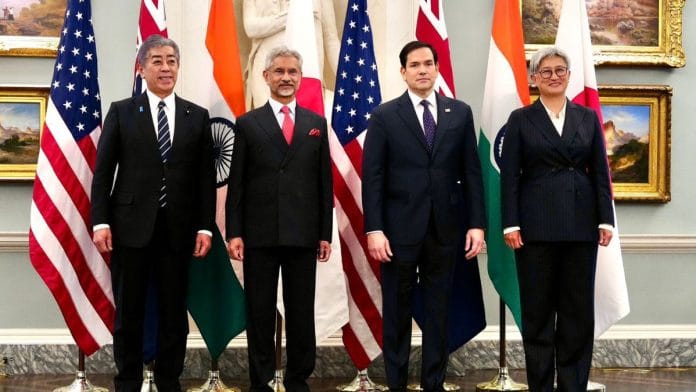New Delhi: Hours after US President Donald Trump’s inauguration Monday, the Quad foreign ministers met in Washington for talks focused on ensuring a free, open, stable and prosperous Indo-Pacific and opposing any unilateral action to change the status quo.
External Affairs Minister S. Jaishankar also held a bilateral meeting with the new American Secretary of State Marco Rubio. Incidentally, it was Rubio’s first bilateral meeting after being confirmed as the pick for the position.
“Significant that the Quad FMM (Foreign Ministers’ Meeting) took place within hours of the inauguration of the Trump administration. This underlines the priority it has in the foreign policy of its member states,” Jaishankar said immediately after the meet.
He said that he had wide-ranging discussions with Rubio, Japanese Foreign Minister Takeshi Iwaya and Australian Foreign Minister Penny Wong, and “agreed on the importance of thinking bigger, deepening the agenda and intensifying collaboration”.
“The meeting today sends a clear message that in an uncertain and volatile world, the Quad will continue to be a force for global good,” he said.
A joint statement released post the meeting said that they shared commitment to strengthening a free and open Indo-Pacific, where the rule of law, democratic values, sovereignty, and territorial integrity are upheld and defended.
“Our four nations maintain our conviction that international law, economic opportunity, peace, stability, and security in all domains, including the maritime domain, underpin the development and prosperity of the peoples of the Indo-Pacific. We also strongly oppose any unilateral actions that seek to change the status quo by force or coercion,” it said.
The statement added that the four countries are committed to strengthening regional maritime, economic and technology security in the face of increasing threats, as well as promoting reliable and resilient supply chains.
“We look forward to advancing the work of the Quad in the coming months and will meet together on a regular basis as we prepare for the next Quad Leaders’ Summit hosted by India,” it said.
Even though India has made it clear that the Quad is not a military alliance, China has been sceptical of the grouping and has spoken out against it.
The germination of the concept of Quad can be traced back to the Malabar Naval exercise series that began between India and the US in 1992. Following the nuclear test, the exercise was discontinued and restarted in 2004.
However, the actual precursor to the Quad was the ‘Tsunami Core Group’ formed in 2004 between India, Japan, Australia and the US to combine humanitarian assistance and disaster relief operations in the Indian Ocean following the tsunami.
In 2007, an informal strategic dialogue between the four countries was started as the Quadrilateral Security Dialogue (Quad), but China objected to it. Australia withdrew and India kept its distance. However, things changed in 2017, when Quad 2.0 was formed.
While it remained at the foreign ministers’ level, it was only during Trump’s tenure that the Quad meet was taken to the leadership level.
India is scheduled to host the Quad leaders’ summit this year.
Meanwhile, Jaishankar also held a bilateral meeting with his American counterpart. He also met with the new US National Security Advisor Mike Waltz and said that he was looking forward to “working together on an active and outcome-oriented agenda”.
It is expected that while there may be tariff issues, the overall relations between India and the US are set to deepen under the new Trump administration.
Incidentally, Jaishankar was seated in the front row at Trump’s oath-taking ceremony, even as other Quad foreign ministers were seated two rows behind.
Also Read: Trump decision on US birthright citizenship could make Indians rethink immigration plans






